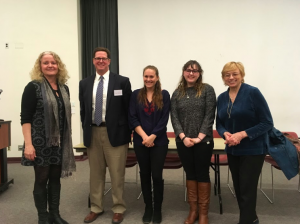By Darby Murnane Contributing Writer
A conference on modern-day human trafficking was recently co-hosted at UMF by The International and Global Studies Program, the Office of Global Education and the Pi Sigma Alpha Political Science Honors Society.
The conference included the screening of the documentary “I Am Jane Doe,” a speech by UMF student and human trafficking survivor Moninda Marube and panel discussion presented by other survivors and advocates.
Marube, a Community Health major, was the genius behind the conception of the conference. Seven years ago, he came to the U.S. from his home in Kenya to run races in hopes of raising money to bring home, where he lived in extreme poverty. However, all of the money he made was taken by a manager who also held Marube’s passport and documents so he could not walk away. Marube ev

The conference aimed to inform people of the dangers and sings of human trafficking. (Photo by Darby Murnane)
entually escaped to Maine, where he is still running and getting a college education.
The conference began with a showing of “I Am Jane Doe,” a film documenting the stories of families who sued Backpage.com, a website where their daughters had been sold into sex trafficking. Following the film was a short panel discussion involving UMF students representing the College Republicans and Democrats, as well as Attorney General Janet Mills and District Attorney Andrew Robinson. A major theme of the evening was imparting the knowledge that the face of human trafficking is not what one might see in movies. Robinson said, “It can happen to anybody’s kid from any kind of neighborhood. And it is happening in our neighborhoods.”
In an interview with Marube, he said “The days are long gone when people are forced to do things. The human exploitation that is going on in the world right now is not like the transatlantic slavery, whereby people were being abducted from their country and being put in chains. Those are very minimal cases. Nowadays it is about manipulation and blackmail.”
Marube defines the human trafficking network as a tree. “You can trim the branches,” he said, “but the roots keep growing.” One of the biggest challenges in combating trafficking is the ability to recognize victims and the ways in which their traffickers ensnare them. “Right now the signs are so hidden,” Marube said.
Janet Mills said after the panel following the documentary that she is pleased this conference is being held. “Public education is key. Parents and families need to know this happening,” Mills said.
Kristen Cloutier, a Secondary Education Social Studies major in the audience, was shocked to learn the scope of the realities of human trafficking.
“I knew what human trafficking was, but I never realized the immense reaches of it,” Cloutier said. “I had never even heard of Backpage before tonight. This has definitely been an eye-opener.”
In an email interview, Dr. Nicole Kellett of the International and Global Studies Program shared her goals for the conference as she too believes in the power of educating people.
“I hope that it raises awareness and incites action,” Kellett said. “You may be able to recognize a situation of trafficking and help. You may find yourself in a situation of being trafficked and know about resources to get out. You may be better informed on how to evaluate policies to be a more educated voter to support legislation that helps prevent trafficking.”
Marube shared an important message to impart when reflecting on it all; “I think each of you have a life, and each of you have a purpose in life. There are two most important days in your life: the day you were born and the day you know why.”